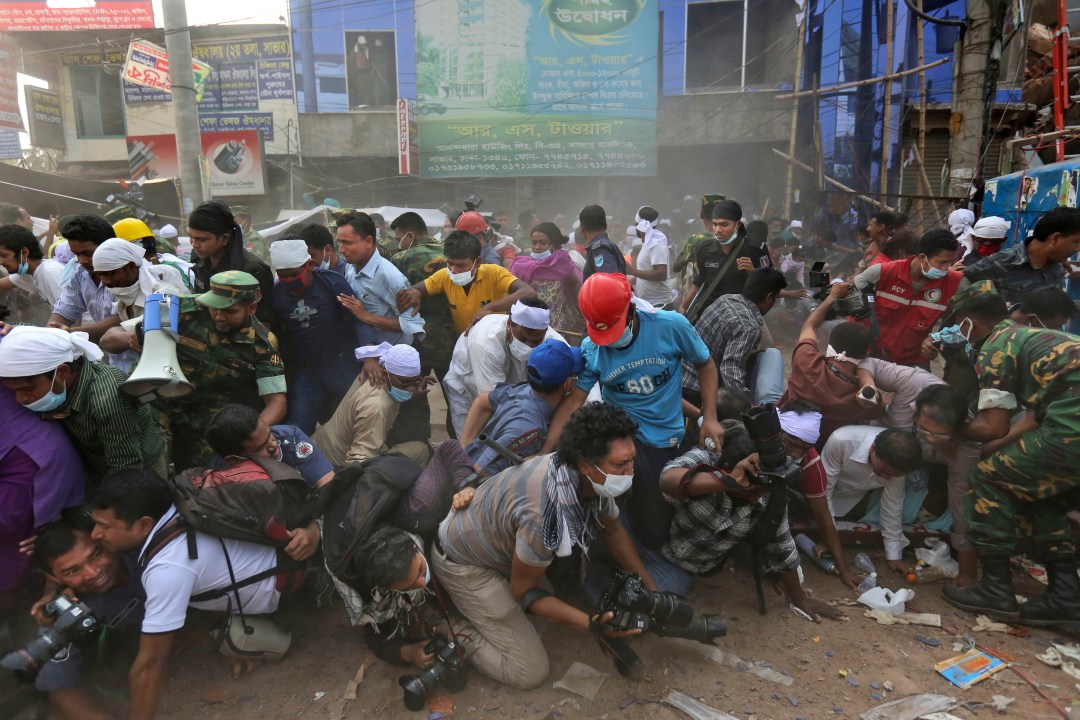In today’s Telegraph David Blair has a strong and angry piece arguing that we – that is, western consumers – are complicit in or partially responsible for the deaths of nearly 300 Bangladeshis killed when the building in which they worked collapsed. Many will agree with him. This, they will say, is the true price of our addiction to (or, rather, preference for) cheap clothes manufactured in often appalling conditions. If you shop at Primark today you have blood on your hands.
In the aftermath of an appalling accident such as this it is no surprise that people are calling for more to be done. Some even suggest that factories in Bangladesh and other developing countries be held to the same standards that apply to factories and working conditions in countries such as the United States or the United Kingdom. Intuitively, this seems an appealing argument. But it is, nevertheless, an inadequate one.
As Matt Yglesias says there are very good reasons why Bangladeshi health and safety standards are lower than those pertaining in richer countries. We may deplore third-world sweatshops but doing so is, in the end, a way of propping up our own self-esteem rather more than it is any useful concern for the lives of the men and, chiefly, women working in these factories.
It would be better if more buildings in Bangladesh met existing, local, safety regulations. It may well be that western companies could and should do more to monitor the conditions in which their contractors work. Be that as it may, sweatshops in the developing world have, on balance, been a good thing. And it is not even close.
For most of human history most life has been brutal, nasty and short. This is not something to celebrate but nor can it be avoided. Working conditions in Bangladeshi garment factories may often remain pretty dreadful. But they are better than life toiling in the fields. Some 45% of Bangladeshis work in agriculture, many of them still, alas, on terms little better than subsistence farming. By contrast, working in a clothing factory is, relatively speaking, an attractive option.
Some three million people in Bangladesh work in that country’s textiles and clothing industry. Many of them are women, empowered as never before in the country’s history. We might deplore the conditions in which they are compelled to work but that should not blind us to the fact that, like it or not, these are still preferable to the alternatives realistically available to them.
The Bangladeshi economy has been growing at approximately 6% a year recently. The minimum wage paid to garment workers may still seem appallingly low by our standards but in 2010 it was still nearly double what it was in 2006. Life in Bangladesh is getting better.
We look at the teeming cities of the developing world and the millions still living in slum conditions and see dreadful stories of human degradation and failure. There is, for sure, something to this. But it is not the entire story. We too rarely pause to contemplate the alternatives. And those alternatives are often even worse. As Harvard’s Ed Glaeser put it in his terrific book The Triumph of the City:
The extreme-poverty rate in Lagos, when corrected for higher prices in the city, is less than half the extreme-poverty rate in rural Nigeria. About three-quarters of Lagos residents have access to safe drinking water, a figure that is horribly low but that is far higher than anyplace else in Nigeria, where the norm is less than 30 percent. Kolkata is also considered a place of great deprivation but the poverty rate in that city is 11 percent while the poverty rate in West Bengal is 24 percent. In recent years, more than 10 percent of West Bengal’s residents have faced food shortages; the comparable figure for urban residents is less than 1 percent.
Life, however nasty, in these cities is preferable to the miseries of rural poverty. Similarly, life working in what we deem a sweatshop is, for millions, preferable to the alternatives available to them. Making it significantly more difficult – and more expensive – to hire Bangladeshi workers is likely to actually impoverish Bangladesh.
Globalisation has been an extraordinary success. Millions, perhaps even billions, of people are better off as a result. Like any Great Improvement it has been an uneven process and never a cost-free endeavour either. Nevertheless, the sweatshops well-intentioned westerners deplore have played a large part in this process. In the context of Bangladesh or Pakistan the workers in these factories are the lucky ones.
You need not rely on my word for this. Here’s Paul Krugman:
[W]herever the new export industries have grown, there has been measurable improvement in the lives of ordinary people. Partly this is because a growing industry must offer a somewhat higher wage than workers could get elsewhere in order to get them to move. More importantly, however, the growth of manufacturing–and of the penumbra of other jobs that the new export sector creates–has a ripple effect throughout the economy. The pressure on the land becomes less intense, so rural wages rise; the pool of unemployed urban dwellers always anxious for work shrinks, so factories start to compete with each other for workers, and urban wages also begin to rise.
[…] These improvements have not taken place because well-meaning people in the West have done anything to help–foreign aid, never large, has lately shrunk to virtually nothing. Nor is it the result of the benign policies of national governments, which are as callous and corrupt as ever. It is the indirect and unintended result of the actions of soulless multinationals and rapacious local entrepreneurs, whose only concern was to take advantage of the profit opportunities offered by cheap labor. It is not an edifying spectacle; but no matter how base the motives of those involved, the result has been to move hundreds of millions of people from abject poverty to something still awful but nonetheless significantly better.
As he says, it is not an especially edifying spectacle. But it is better than what was there before. Is it callous to think that industrial accidents – even tragedies – are, to put it in unfortunate terms, a price worth paying for this improvement? Perhaps it is. Capitalism can be a brutal mistress. But, viewed as dispassionately as possible, it is a price the Bangladeshis themselves are prepared to pay.
And, as Krugman suggests, increased competition and higher wages actually helps to drive standards up, not down. Could things be better still? Of course they could. But they could be and until very recently were very much worse too. As Krugman, again, wrote:
The advantages of established First World industries are still formidable. The only reason developing countries have been able to compete with those industries is their ability to offer employers cheap labor. Deny them that ability, and you might well deny them the prospect of continuing industrial growth, even reverse the growth that has been achieved. And since export-oriented growth, for all its injustice, has been a huge boon for the workers in those nations, anything that curtails that growth is very much against their interests. A policy of good jobs in principle, but no jobs in practice, might assuage our consciences, but it is no favor to its alleged beneficiaries.
I think he’s right. Perhaps this is a chillingly bloodless way of looking at the world. It certainly challenges western self-righteousness. That self-righteousness is, in the end, based upon a kind of guilt. We feel bad that we benefit from the labour of Bangladeshis toiling in conditions that we would deem unacceptable in this country. But human development moves unevenly and what is appropriate, sensible or useful for one country at one stage of its improvement may not be appropriate, sensible or useful for another country at quite another stage.
Moreover, the beneficiaries in the west of all this cheap labour are not just large corporate concerns but, also, our own poor who would otherwise have to spend a greater proportion of their own meagre resources on clothing. This may not be the biggest point in the world but it is not an entirely trivial one either.
These deaths in Bangladesh are awful. There are good reasons for hoping that rapacious western countries take a bigger, closer, interest in the conditions under which their sub-contracted labourers toil. But western fastidiousness or guilt should not blind us to the fact that grim as they may be these sweatshops – and globalised capital – have been a force for good.








Comments